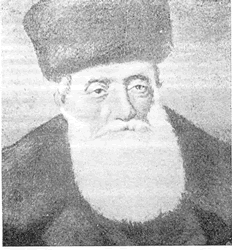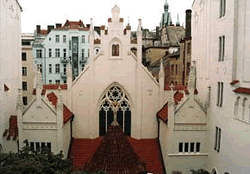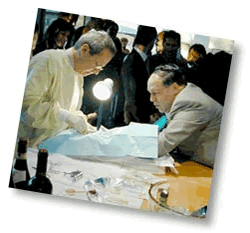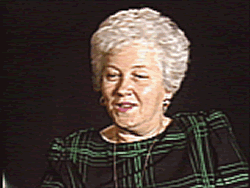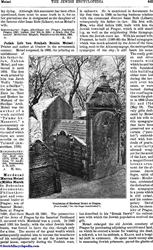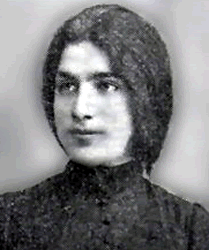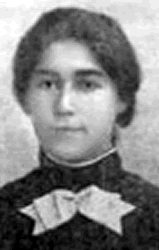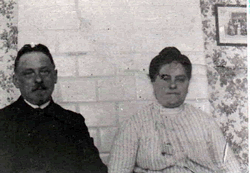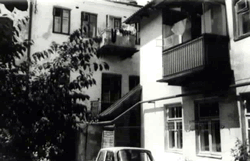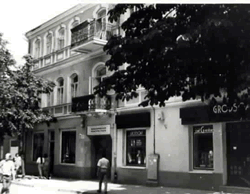Printer and author at Cracow
in the seventeenth century. Meisel reopened, in 1663, the printing establishment
of his father-in-law, Nahum Meisel, and continued it until 1670. The first
work printed by him was Jacob Weil's "Sheichot u-Bedichot";
the last one, the Eben ha-'Ezer and ?oshen ha-Mishpacha of the Shulchan
'Aruk. Meisel was the author of a work entitled "Cha'ame ha-Massoret,"
a commentary on the Masorah, at the end of which there are some novellÃþ
on the Talmud (Amsterdam, 1728).
Bibliography: Steinschneider, Cat. Bodl. cols. 1373, 2986;
M. Zunz, 'Ir ha-?ede?, Supplement, p. 34, note.J
Mordecai Marcus Meisel (Miška Marek in Bohemian documents):
Philanthropist and communal leader at Prague; son of Samuel Meisel; born
at Prague 1528; died there March 13, 1601. The persecution of the Jews
of Prague by the fanatical Ferdinand I. occurred while Mordecai was a
youth. In 1542 and 1561 his family, with the other Jewish inhabitants,
was forced to leave the city, though only for a time. The source of the
great wealth which subsequently enabled him to become the benefactor of
his coreligionists and to aid the Austrian imperial house, especially
during the Turkish wars, is unknown. He is mentioned in documents for
the first time in 1569, as having business relations with the communal
director Isaac Rofe (Lékarz), subsequently his father-in-law.
His first wife, Eva, who died before 1580, built with him the Jewish town-hall
at Prague, which is still standing, as well as the neighboring Hohe Synagoge,
where the Jewish court sat. With his second wife, Frummet, he built (1590-92)
the Meisel synagogue, which was much admired by the Jews of the time,
being, next to the Altneusynagoge, the metropolitan synagogue of the city;
it still bears his name. The costly golden and silver vessels with which
he and his wife furnished this building either were lost during the lawsuit
over his estate or were burned during the conflagrations in the ghetto
in 1689 (June 21) and 1754 (May 16). The only gifts dedicated by Meisel
and his wife to this synagogue that have been preserved are a curtain
("paroket") embroidered with hundreds of pearls, a similarly
adorned wrapper for the scroll of the Law, and a magnificent bronze ornament
for the almemar. Jacob Segre, rabbi of Casale-Monferrato, celebrated the
dedication of the synagogue in a poem which is still extant, and his contemporary
David Gans, the chronicler of Prague, has described in his "?ema?
Dawid" the enthusiasm with which the Jewish population received the
gift.
(see image) Tombstone of Mordecai Meisel at Prague.(From Jerabék,
"Der Alte Prager Judenfriedhof.")His Benefactions.Meisel enlarged
the old Jewish cemetery of Prague by purchasing adjoining uncultivated
land, on which he erected a house for washing the dead, a mi?weh, a bet
ha-midrash, a Klaus, and a hospital (still in existence). He spent much
money also in ransoming Jewish prisoners; paved the ghetto ofPrague, which
had been much enlarged at that time; often provided clothing, of a uniform
pattern, for all the poor of his community; presented large dowries every
year at ?anukkah to two poor brides chosen by lot; lent large sums without
interest to needy merchants; and provided for the widows and orphans of
the community. He presented costly synagogal vessels and adornments to
other communities, including those of Cracow, Posen, and Jerusalem. He
presented and loaned altogether the sum of 20,000 thalers to the community
of Posen when it was burned out June 11, 1590; gave generously to Christian
philanthropies, contributing a considerable amount toward the completion
of the Church of the Savior; and repeatedly lent large sums to the empress
as well as to the emperor, being rewarded with considerable privileges,
many of which affected the Meisel synagogue. This synagogue had a standard
with an escutcheon; it might not be entered by any officer of the law;
it was exempt from taxation for all time. Although Meisel had no children,
the emperor granted him the right to dispose of his estate; but after
his death the heirs were involved in difficulties as a result of this
privilege. He had the right also to mint shekels for ritual purposes ("pidyon
ha-ben" and "ma?a?it ha-she?el"), and one of these coins,
dated 1584, is still in existence.Meisel's last will and testament, which
he drew up in the presence of Chief Rabbi Löw (Judah Löw
b. Bezaleel), the communal director Joachim Brandeis, and Meïr
Epstein, leaving his estate to his two nephews, Samuel the Elder and Samuel
the Younger, is still extant in manuscript. He was interred with the highest
honors. Immediately after his burial the Bohemian treasury, at the instance
of the emperor, confiscated his estate, consisting of 516,250 gulden in
money together with many houses. Whatever was found was carried off; one
of the chief heirs was tortured into revealing the hiding-place of what
had been concealed, which also was claimed. Meisel's wealth and philanthropy
have become proverbial among the Jews, and many anecdotes are connected
with his name.
Bibliography: Lieben, Gal 'Ed;
Foges, AltertÃ1ž4mer der Prager Josefstadt;
Hock-Kaufmann, Die Familien Prags, Presburg, 1892;
A. Kisch, Das Testament Mardochai Meysels;
idem, Das Meiselbanner in Prag, Prague, 1901.D. A. Ki.Moses b. Mordecai
Meisel: Russian scholar and communal worker; born in Wilna about 1760;
died in Hebron, Palestine, after 1838. He was shammash of the community
in his native town and was in his younger days one of the followers of
Elijah Gaon. Later he joined the ?asidim, but did not participate in the
bitter controversies concerning them which disturbed the Polish Jewry
in those times. He was a great admirer of Moses Mendelssohn and approved
Solomon Dubno's bi'ur of Genesis (1783). There is also an approbation
by Meisel of Samuel Gershoni's "Debar Shemuel" (Byelostok, 1814).
He left Wilna for Palestine in 1813 and settled in Hebron. Dr. Löwe,
who met him there in the summer of 1838, describes him as an old man well
acquainted with German literature.Meisel was the author of "Shirat
Mosheh" (Shklov, 1788), a poem on the 613 precepts, each line beginning
with a letter from the Ten Commandments. His son Aryeh Löb
(d. 1835) was a leader among the ?sidim of Wilna.
Bibliography: Fuenn, ?iryah Ne'emanah, pp. 246-247, 288, Wilna, 1860;
M. A. Ginzburg, Debir, pp. 47-48, Warsaw, 1883.H. R. P. Wi.Samuel Meisel
(the elder): Nephew of Mordecai Marcus b. Samuel; born in 1585; died in
1630. He was wealthy and prominent in affairs. In 1616 he received an
imperial privilege. The printing-press of Abraham Heide (Lemberger) was
situated in his house. After Mordecai Meisel's death the settlement of
his estate involved his family in a tedious suit with the government,
and from the records of this suit is derived the information regarding
the members of this family. One of the houses belonging to the estate
was awarded, in 1610, to a nephew, Jacob, and his wife, Johanka; and three
years later, King Matthias, successor of Rudolf II., gave the remaining
real estate to another nephew, Samuel Meisel (the younger; d. 1625), son
of Simon. The Meisel synagogue and other property were awarded to the
Jewish community. As the state had confiscated all the money (more than
500,000 gulden) and most of the real estate, the family sued the community
for the income from the synagogue, the baths, institutional buildings,
etc., amounting to 800 florins a year. The rabbinate thereupon excommunicated
the entirely impoverished family (c. 1670), and this led to indescribable
persecutions and scandals. Decent burial was refused to Marek, son of
the younger Samuel Meisel, in 1674, and the funeral cortège
was insulted. His daughter was attacked in her house by the mob, and the
family had to pay large sums in order to secure honorable burial for the
heir Joachim Meisel. It did not appear until the final verdict rendered
in this suit by the magistrate of Prague Sept. 13, 1684, that through
the machinations of the notorious apostate Philipp Lang, chamberlain to
the emperor until 1608, the record of Meisel's privileges had been secretly
stricken from the official register in 1601, on the ground of their having
been obtained by fraud, and that the sums subsequently paid to the widow
and to the heirs, and the two houses given them, were alleged to have
been merely gifts. The heirs, naturally, were not satisfied with this
decision; but the great fire in the ghetto of Prague, in 1689, which destroyed
the Meisel synagogue and the other buildings of the estate, terminated
the controversy. The family flourished at Prague down to modern times;
and branches of it are found at Warsaw, Budapest, Breslau, and Berlin.
Bibliography: A. Kisch, Das Testament Mardochai Meysels;
Lieben, Gal 'Ed;
Benedikt Foges, AltertÃ1ž4mer der Prager Josefstadt.D. A. Ki.Wolf
Alois Meisel: Hungarian rabbi; born at Roth-Janowitz July 16, 1815; died
at Budapest Nov. 30, 1867. Owing to his father's conversion to Christianity,
the family relations were so inharmonious that he reached the age of seventeen
before he was able to begin definite preparation for the future. In 1832
he went to Hamburg, where he applied himself to the study of the Talmud
and graduatedfrom the gymnasium. He entered the University of Breslau
in 1838, where he continued his study of the Talmud and attended lectures
on rhetoric. In 1848 he was called to the rabbinate of Stettin, and on
May 11, 1859, to that of Budapest. Here he was in constant conflict with
his congregation owing to the state of transition, both in religion and
in politics, through which the Hungarian Jews passed during his administration.
His "Homilien Ã1ž4ber die SprÃ1ž4che der VðËter"
(Stettin, 1851; Hungarian transl. by Bauer Márkfi Lörincz,
Budapest, 1862) are models of Jewish pulpit-literature. His "Prinz
und Derwisch," poems (Stettin, 1847; 2d ed., Budapest, 1860), and
"Der PrÃ1ž4fstein," poems (published posthumously by
the Meisel-WohlthðËtigkeitsverein, Budapest, 1878), are
translations. He died suddenly while preaching a sermon, which Simon Bacher
and his son Wilhelm Bacher published in German and Hebrew under the title
"Die Brunnen Isaak's" (ib. 1867).
Bibliography: Kayserling, W. A. Meisel;
ein Lebens- und Zeitbild, Leipsic, 1891;
Venetianer, A Zsidé¯ság Szervezete, pp.
496 et seq.;
BÃ1ž4chler, A Zsidé¯k Torténete,
pp. 479 et seq.;
Pallas Lex.;
Hochmuth, Leopold Löw, pp. 208 et seq., Leipsic, 1871.S.
L. V.
#masl-8
This is the picture of my great-grandparents, Akiba and Olga (nee
Palkin) Maizel of Grodno. Akiba originated in Svisloch according to
their son Moisei's university records. According to my mother, her
father's grandfather was a rabbi or wise man from a family of rabbis.
Moisei, my grandfather's older brother became a physician and resided
in St. Petersburg--he and his son perished during the Seige of
Leningrad. I don't know what happened to their two daughters. My
great-grandparents apparently moved from Grodno to St. Petersburg
sometime after 1912, and died there ca 1914-1916
Olga G Parker" <ogparker@rushmore.com>
MAISEL, wife Hannah (Henie)(nee AMHOWITZ), daughters Sore, Ryfka, Muscha,
Joche, Reisel, Nechame, and son Moiosche. They came on 6-8-1907 (ship:
Astorioa), 7-3-1900 (ship: Estonia), 8-2-1910 (ship Lituania), 7-6-1912
(ship Lusitania). The documents say they lived (were born) in Salushje
(Selushel) - 2 born in Bobruisk. If you know of any way to get records of
them, or find any records of their life in Belarus, please let me know.
Thank you.
Marilyn Nathanson
Farmington Hills, Michigan
After an unsuccessful bid, supported by the Lithuanian constituency of Lodz, to become chief rabbi, Meisel distinguished himself as a posek (legal arbiter) in business and marital disputes. Refusing to accept money from the poor, he considered the restoration of harmony between rival parties sufficient reward.
With the German occupation of Lodz on Sept. 8, 1939, Meisel was implored by his followers to leave Lodz and settle elsewhere. Thus, he and his only child, Mina, joined the many refugee rabbis who settled in Warsaw, under the belief that it would provide a haven. Meisel became active in the religious affairs of the Committee of Rabbis and participated in the tragic meeting at which the rabbis decided to support the ghetto rebellion. He died on Passover in the flames of the ghetto. A visit to his home is remembered by the martyred poet, Yitzchak Katnelson, in the memoir, Ketavim Acharonim. Courtesy of:
Simon Wiesenthal Center
Los Angeles, CA 90035
The Trial of Adolf Eichmann
Witness Lubetkin.....In July 1942 the liquidation of the Warsaw Ghetto began......
......
Q. Meanwhile a Jewish fighting force was established. At its head was Mordechai Anilewicz, Mordechai's deputy, Yitzhak Zuckerman - is he your husband? A. Yes. Q. There was one operation in January 1943. We will not be talking about this - I will be questioning Yitzhak about this. But as Yitzhak was not inside the ghetto in April 1943, please tell us what happened on the eve of Passover, 1943. A. 18 April 1943 was the eve of Passover.....What did we tell the Jews that night? We told them that anyone who possessed arms should come out to fight. Not only the Jewish fighting force but the ordinary Jews as well had arms. .....It is difficult for me to describe life in the ghetto during that week, and I had been in this ghetto for years. The Jews embraced and kissed each other; although it was clear to every single one that it was not certain whether he would remain alive, or it was almost certain that he would not survive, nevertheless that he had reached the day of our taking revenge, although no vengeance could fit our suffering. At least we were fighting for our lives, and this feeling lightened his suffering and possibly also made it easier for him to die. I also remember that on the second day - it was the Passover Seder - in one of the bunkers by chance I came across Rabbi Meisel. There had been contacts between us and him, since the days of the Halutz underground in ordinary times as well. The Halutz underground, in its operations, had not always had an easy time on the part of the Jewish population - they did not always accept us. There were those who thought that we were bringing harm to their lives - as I have pointed out, the collective responsibility, the fear of the Germans. But this time, when I entered the bunker, this Jew, Rabbi Meisel, interrupted the Seder, placed his hand on my head and said: "May you be blessed. Now it is good for me to die. Would that we had done this earlier." .....
Looking for Information
My grandfather's parents were Akiba (who came from Svisloch according
to their son Moisei's university records) and Olga (ne Palkin) Maizel.
My ggf was a "private attorney". I have a modern picture of the
building in which they lived in 1912, and a picture of them. According to my mother, her
father's grandfather was a rabbi or wise man (to whom people turned for
advice). According to her father, he was from a family of rabbis. I have no
firm information as to which rabbinic family this was. The story of the
Meisel who was a philanthropist in Cracow sounded familiar to her, and she
felt there was some relationship to the Meisels in Prague. Again, I have
nothing other than her recollection of stories told to her by her father,
and I have no deetails on these.Moisei, my grandfather's older brother became a physician and resided in St.
Petersburg--he and his son perished during the Seige of Leningrad. I don't
know what happened to their two daughters. His wife's family were also
Maizel, and they had a large pharmacy in St. Petersburg. Moisei and Vera
Maizel were married in Bielsk--was there a Maizel rabbi there in 1903? My
grandfather and his younger brother emigrated to the US in 1903 and 1904
respectively. Two sisters remained in Russia--Revekka and Anuta. My
grandparents saw them in Moscow in 1932-1933. I think an older sister left
Russia much earlier and I have no information on her.My great-grandparents apparently moved to St. Petersburg sometime after
1912, and died there ca 1914-1916. So, my family had pretty much left Grodno
before the revolution.The street is Sobornaya Ulitsa in Grodno, and the courtyard scene is entered
through the passageway under the balcony, left of center. My ggp's apartment
was on the 2nd floor of the building to the right that has a balcony (I
think that was their apartment). According to a rental document, it "had no
heat"--which probably means they heated it with a stove, rather than central
heating. The picture on your Maisel page to which I referred was
#masl-6:a.Chana Maisel of Grodno. My grandfather had a sister Anuta and I had wondered if
Chana could've been called Anuta by her family and friends.
Best wishes,Olga Parker
